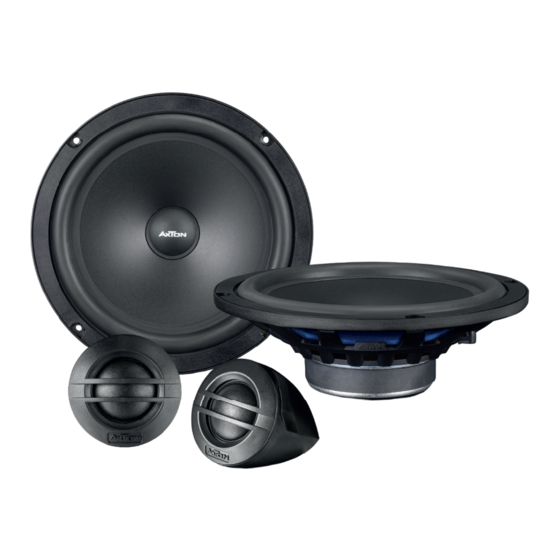AXTON ATC100S Handbuch für Installation und Betrieb - Seite 6
Blättern Sie online oder laden Sie pdf Handbuch für Installation und Betrieb für Auto-Empfänger AXTON ATC100S herunter. AXTON ATC100S 11 Seiten. Component systems

TWEETER MOUNTING LOCATION
The tweeter positioning does exhibit a direct and profound influence on the front staging
of your component system. Depending on the chosen location where the tweeters are
installed, different loudness levels in the treble region will result. The tweeter level can
be adjusted by a 2-way switch inside the x-over, to compensate for different mounting
locations.
To determine the best tweeter location, it may be necessary to carry out short listening
n
tests with the tweeter mounted to different locations inside the vehicle. For this, double
sided tape can be used.
Set all tone controls, i.e. pre-EQ, treble / bass and loudness functions of your head unit
n
to the neutral position first, before you attempt listening to the speakers installed in your
car.
The influence of the tweeter mounting location on the front staging is profound – and care
must be taken to achieve a good compromise between unobtrusive mounting and good
sound quality.
Examples of different tweeter mounting locations, and the results that are most frequently
obtained, are explained below:
1 A-Pillar
Best option concerning the depth of image and overall sound balance of the
component system. Not that easy to get right, i.e. excessive mounting effort.
2 Dash Board
Sometimes aggressive and overly brilliant treble reproduction caused by the horn
loading effects of the front window. Setting tweeter to -3 dB may help.
3 Window Triangles
Bright sound combined with a high soundstage, sometimes sounding a bit "nervous"
with side biasing.
4 On the upper end of the door panel
Balanced sound, but with reduced sound staging and with side biasing.
5 Right on top of the mid/woofer
"Dull" sound, especially with a person sitting on the passenger's seat.
Note: An "on-axis" installation (with tweeters directly pointing at the listener) is not re-
quired, nor recommended.
Tweeters directly aiming at the listener's ears are usually responsible for the unwanted
"side-biasing" effect, where the sound seems to originate from the drivers, instead of float-
ing on top of the dashboard.
– 10 –
– 10 –
TWEETER INSTALLATION
There are various ways to install the tweeters. The box contains two different types of
mounting adapters.
Flat Surface Mounting
The tweeter system consists of two parts: The main tweeter unit and the surface mount
adapter.
Mark the location where you are going to mount the tweeters. Use the mounting adapter
as a template and mark the hole with a bigger diameter for the cables and two 2.5 mm
holes for the screws. Drill the holes on each side and mount the adapter with two counter-
sunk screws. Feed the wire through the hole and connect it to the wire extension that goes
to the crossover. Lock the tweeter by pushing it down into the mounting adapter.
Angled Mounting
The tweeter system consists of two parts: The main tweeter unit and the angle mount
adapter.
This adapter provides two bearing surfaces with two possible radiation angles. Inside the
adapter you can spot two areas with implied holes for the cable and the fixing screws.
Chose the area you want the way to mount the adapter and drill out the holes completely:
6 mm for the cable and 2.5 mm for the screws. Mark the location where you are going to
mount the tweeters. Use the mounting adapter as a template and mark the holes with a
6 mm diameter for the cables and two 2.5 mm holes for the screws. Drill the holes and
mount the adapter with two countersunk screws. Feed the wire through the bigger hole
and connect it to the wire extension that goes to the crossover. Lock the tweeter by push-
ing it down into the mounting adapter. Make sure the tweeter grill is horizontally in order
that the diffusor can work properly.
Flush Mounting
After choosing the best mounting location, make sure there is at least 20 mm of clearance
behind the mounting surface, before you start to mark or cut anything! Cut a hole with
exactly 42 mm diameter into the mounting surface using a power drill and a circle cutter
tool. Lock the tweeter by pushing it down into the hole. To definitely secure the tweeter
in the hole you can fix it with hot glue from behind. Attach the wire to the extension cable
that goes to the crossover.
– 11 –
– 11 –
